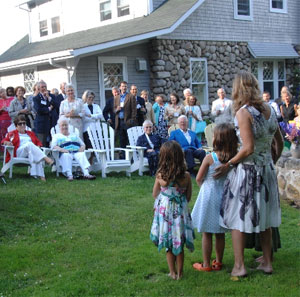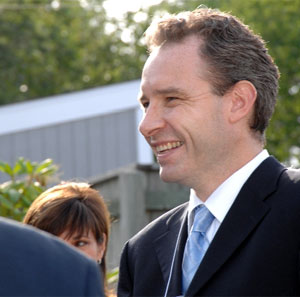 |
| Sarah Dennis addresses the reception in Chester. (Danny Abriel Photo) |
On an idyllic Nova Scotia summer evening in Chester, Dr. Michael Esser, Dalhousie’s newly-appointed William Dennis Chair in Pediatric Epilepsy Research, was welcomed by the Dennis family and friends and supporters of the chair.
Commenting on the meaning of the occasion, Sarah Dennis says: “For me it’s about families. It’s the loss of a beloved member of our family and the support we’ve gotten from families since William’s death. I think it’s about trying to help other families in Atlantic Canada. It’s the Dal family, it’s the Esser family coming here. It really is about families.”
In 2002, Ms. Dennis’ brother William died suddenly, at the age of 30, from complications related to an epileptic seizure. The $3.5-million fundraising goal for the Chair—the first of its kind in Canada—was realized thanks to a $2.3-million gift from the Dennis family and the generosity of other donors. William’s father, Graham Dennis, observes: “I think you’ve got to return to society what it’s given you.”
 |
| Dr. Michael Esser. (Danny Abriel Photo) |
“It’s unique in Canadian medicine and in Canadian research to be offered this opportunity,” says Dr. Esser, who was greeted in remarks by Ms. Dennis, Dalhousie president Dr. Tom Traves and Dean of Medicine Dr. Harold Cook. “It’s a great melding of individual sponsorship and family sponsorship and two fine institutions, the IWK and Dalhousie, coming together with a unified goal – to help kids.”
Dr. Esser, who will be based at the IWK Health Centre, has a cross-appointment with Dalhousie’s pediatrics and pharmacology departments. In addition to carrying out basic science and clinical research, he will work to increase public awareness of epilepsy.
Dr. Cook says it surprises people how frequently epilepsy appears in the population and at various stages of life. “There’s a lot we do not know about its origins, and even the best treatments in some areas are still somewhat experimental.”
He says understanding the basic underlying science and correlating that with clinical observations will ultimately lead to improved care.
